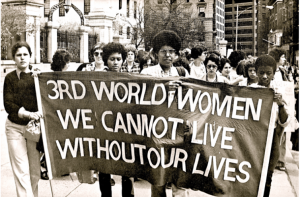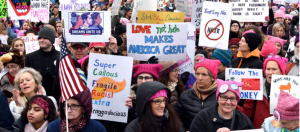Both Lorraine Bethel in “What Chou Mean We, White Girl?”, printed in 1979, and Charlotte Bunch in her 1985 essay “Going beyond Boundaries” respond to this question of how to build community as they consider the burden of education often placed on Third World women. In Bethel’s poem “What Chou Mean We, White Girl?” printed in conditions: five, the speaker criticizes the “so-called radical white lesbian / feminist(s)” who invite her to their conferences and panels “because they want to represent Third World women and lesbians / on their feminist criticism panel” and as “THE BLACK / LESBIAN / FEMINIST / CRITIC” she is “such a convenient package” (8-9, 7, 10). The speaker shows how these white feminists have simplified and grouped together her intersectional identities, inviting one woman who must represent the diverse perspectives of many women. The speaker mimics white women who seem to say, “Don’t come as you are, / but as we’d like you to be; our worst fantasy / primal nightmare, our best dream” (31-32). Just like in Carrillo’s “And When You Leave, Take Your Pictures With You,” these white feminists do not accept Third World women outside of their picture frames, outside of their preconceived notions of what they should be.
In her 1985 essay “Going beyond Boundaries,” delivered six years after the publication of conditions: five, Bunch echos this critism as a white feminist. Bunch, like Bethel, argues that women of color often have to explain their daily sufferings to white women who coldly treat them as living primary sources, not as fellow women. To ameliorate this problem, Bunch calls for the complete elimination of the terms “Third World,” “developed,” and “developing,” rejecting the “condescending notion that the Western industrialized world is ‘developed’” which comes from “a strictly industrialized interpretation of that word” (Bunch, p. 151-152).

Women’s March in 1979 (Goodman).

Women’s March in 2019 (“2019 Boston”).
In 1979, Third World women marched in Boston to protest the murders of Black women, clutching a sign that read “3rd World Women, We Cannot Live Without Our Lives.” Exactly forty years later, in 2019, another protest took place in Boston, and women and men of all ages and heritages marched together as part of the global Women’s March. Even as feminist movements expand to include more people, I, a young white woman in 2019, continue to wrestle with two central questions. How can we, in the twenty-first century, learn about Third World Women—and their diverse histories, heritages, and forms of resistance—without tokenizing them? How can we speak about and remember the Feminist Poetry Movement in an inclusive way?
Sources:
Bethel, Lorraine. “What Chou Mean We, White Girl?”. conditions: five, vol. 1, no. 5, 1979.
Bunch, Charlotte. “Going beyond Boundaries.” The American Women’s Movement, 1945-2000, edited by Nancy MacLean, Bedford/ St. Martin’s, 2009, p. 149-154.
conditions: five, vol. 1, no. 5, 1979.
Goodman, Donna. “The Untold Side of Second Wave Feminism: A Multinational, Politically Diverse Movement.” Liberation School, 21 March 2019, https://liberationschool.org/feminism-and-the-mass-movements-1960-1990/. Accessed 10 December 2019.
“2019 Boston Women’s March is Saturday, Jan. 19th.” BosGuy.com, 13 January 2019, https://bosguy.com/2019/01/13/2019-boston-womens-march/. Accessed 10 December 2019.
